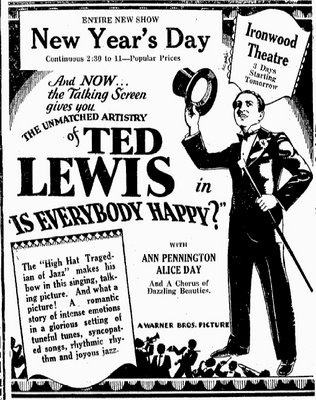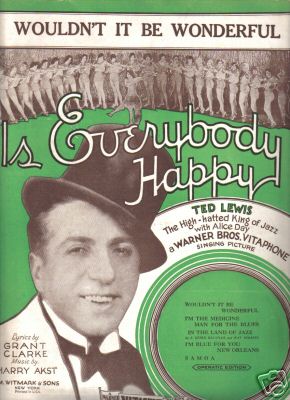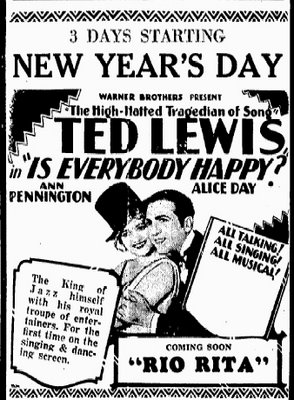
If there's such a thing as a Land of Jazz, then I imagine it's one of the few bright corners in the Land of Lost Films, which is where the motion picture to our right currently resides, holding nightly court with thousands of other movies that meekly claim this unhappy territory as their Country of Residence.
Victims of neglect, fire, mishandling, self-destruction, greed and folly, most lost films leave traces of themselves behind --- clues both plain and cryptic that while seldom leading to their discovery and rescue, at the very least serve to provide some idea of what they were like.
Although reading about a film we can no longer see can often be fascinating, doing so is ultimately frustrating and unsatisfying --- like someone describing a delicious meal in great detail that you could have partaken in had you arrived only a few hours earlier. But, we've no choice except to work with what we have --- and sometimes, we have more than just printed text and visual mediums --- much more, in fact.
In the case of early talking films, the Warner Brothers Vitaphone product in particular, although the picture (film) element may seem to have ceased to exist in either private or public hands, oftentimes what's left behind is the film's soundtrack --- which was recorded on discs that played in synchronization with the film. Such a film was "Is Everybody Happy?" a serio-comic musical released by Warner Brothers to theaters in late October of 1929, with bandleader, musician and recording artist Ted Lewis as it's star, and who's signature phrase prompted the film's title --- which must have looked rather jarring on theater marquees to a public as yet unsure of what to make of the odd circumstances occurring on Wall Street in the last week of that month.
 Today, we have so much of the various elements of "Is Everybody Happy?" that at times the missing visual element, the film itself, seems almost besides the point. Almost. We've sheet music, printed contemporary reviews, a complete transcript of the film's dialogue script, 78rpm commercial recordings of tunes from the film, photographic stills, movie posters, countless newspaper ads and printed publicity items including colorful advertising heralds and posters.
Today, we have so much of the various elements of "Is Everybody Happy?" that at times the missing visual element, the film itself, seems almost besides the point. Almost. We've sheet music, printed contemporary reviews, a complete transcript of the film's dialogue script, 78rpm commercial recordings of tunes from the film, photographic stills, movie posters, countless newspaper ads and printed publicity items including colorful advertising heralds and posters.Lastly, but not least, we have not one but two complete soundtracks for the film that were recorded on the aforementioned Vitaphone disc system. One is the soundtrack that would have been heard along with the film in any English speaking territory in the world, and the other was especially recorded for a slightly abbreviated version of the film that was prepared for release in countries where the English language wasn't widely understood or spoken. For this export version, most of the film's dialogue was removed and replaced with explanatory title-cards written in the appropriate foreign language and the resulting product was largely a silent film with a pre-recorded musical and sound effects score. Left intact, however --- and this was the case with virtually all musical films doctored for international export at the time --- was the music and song sequences as originally performed in the film, for these presumably needed no translation, although what the patrons of a Bolivian cinema made of flashy scenes of chorus girls prancing about in New York night clubs is something lost to time and memory.

The plot of "Is Everybody Happy?" isn't far removed from that of "The Jazz Singer," in that it's the old, old story of Tradition vs. Modern Society, Age vs. Youth --- and as always, the new wins out over the old. Here, Ted (Lewis) and his family emigrate to New York City from Budapest, where Ted's aged father was a renowned violinist. Ted happens upon his old girlfriend from Budapest, Lena (Ann Pennington) who has successfully shaken off both Europe and her accent as a shimmy dancer in a vaudeville house. Ted is smitten with jazz and displays brilliant talent on a borrowed clarinet, but lacks his own instrument. Without giving much thought to the consequences, Ted sells his father's prized violin (given to him personally by the Emperor Franz Joseph) and before long is a smash success. His father, crushed and heartbroken, leaves his home, wife and son to wander off to points unknown.
As could be expected, Ted's fantastic success (he has his own night club by now) means nothing without his father's love --- and to make matters worse, his own once hot relationship with Lena has now become a noose about his neck, for he has eyes only for a lovely blonde chorine is his new club, Gail (Alice Day.) Just when things look their blackest for Ted, at Christmas of course, Lena cuts Ted loose, his Father arrives on the scene (via the nightclub where he first confides in Lena who urges a reconciliation), and everyone gathers for a bountiful dinner --- Mom, Dad, Ted, Gail and even Lena --- as Ted serenades his extended family with the film's theme song, "Wouldn't It Be Wonderful."
Audio Addendum:
For this entry, I'm offering four representative audio excerpts from both the domestic and international release versions of the surviving Vitaphone disc soundtrack which you can listen to by clicking on the links, although right-clicking and saving will allow for far smoother playback.
1) It's a melancholy Christmas for Ted, but his Mother --- although seemingly abandoned by her husband, is curiously chirpy despite it all. (Ted Lewis, Julia Swayne Gordon - Incidental music: "Wouldn't It Be Wonderful?") : Excerpt 1
2) While Ted and the band perform "St. Louis Blues," his errant Father wanders into the nightclub where he meets up with Lena. (Lawrence Grant, Ann Pennington, Ted Lewis & his Band.): Excerpt 2
3) The same sequence as above, from the international release version, which includes introductory bridging music (heard over footage that originally contained dialogue) utilizing the tune "If You Want the Rainbow, You Must Have the Rain" from an earlier Warner Bros. Vitaphone film, "My Man" with Fannie Brice. We then hear "I'm the Medicine Man for the Blues" and "St. Louis Blues," (as in excerpt #2 but with much improved fidelity), and finally the titular "In the Land of Jazz.": Excerpt 3 - Foreign Release Version
4) "Dinner Is Served" announces Ted's Father, signaling the happy conclusion of the film and Ted's closing rendition of "Wouldn't It Be Wonderful," which is followed by an orchestral encore that would have served as Exit Music for presumably entertained... albeit somewhat bewildered, departing audiences. : Excerpt 4
###

No comments:
Post a Comment